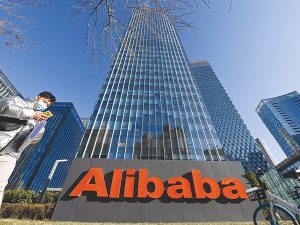Alibaba Group Holding Ltd’s slowest quarter on record comes amid a prolonged crackdown on China’s major technology companies. It’s easy to conflate the two.
But the increased regulatory burden is overshadowed by even harsher problems. Chief among them: peak customer. It’s a reminder that the country’s burgeoning middle class is no longer easy pickings for high-flying companies with ubiquitous platforms.
“We believe we have substantially captured all consumers with purchasing power in China,†CEO Daniel Zhang said. “We’ll focus on a shift from new-user acquisition to user retention and [average revenue per user] growth.†The new approach comes as overall consumption growth falters in China, forcing the company to look overseas for new customers.
Alibaba’s struggle is borne out in the numbers. Revenue for the three months to December climbed just 10%, compared with 29% growth the prior period. Sales at its core commerce unit rose a mere 7%. Those numbers cap a year in which Chinese President Xi Jinping sought to curb the power of internet titans and pivot the country toward “common prosperity,†where wealth and income is shared more evenly.
For companies like Alibaba, social media player Tencent Holdings Ltd, and deliveries provider Meituan, the result has been a push to break up perceived monopolies and soften their competitive advantage. Exclusive listings, leveraging user data to sell services, and excessive subsidies were all in regulators’ sights, forcing companies to sacrifice earnings margins and rethink their business models.
Alibaba executives in August pledged to plow “excess profits†back into parts of its e-commerce business in the form of merchant support, a second-hand marketplace and streaming commerce. At the time, this looked like a reaction to the crackdown, and came just months after the company was slapped with a record $2.8 billion anti-monopoly fine, equal to 4% of its 2019 domestic revenue.
—Bloomberg
 The Gulf Time Newspaper One of the finest business newspapers in the UAE brought to you by our professional writers and editors.
The Gulf Time Newspaper One of the finest business newspapers in the UAE brought to you by our professional writers and editors.
